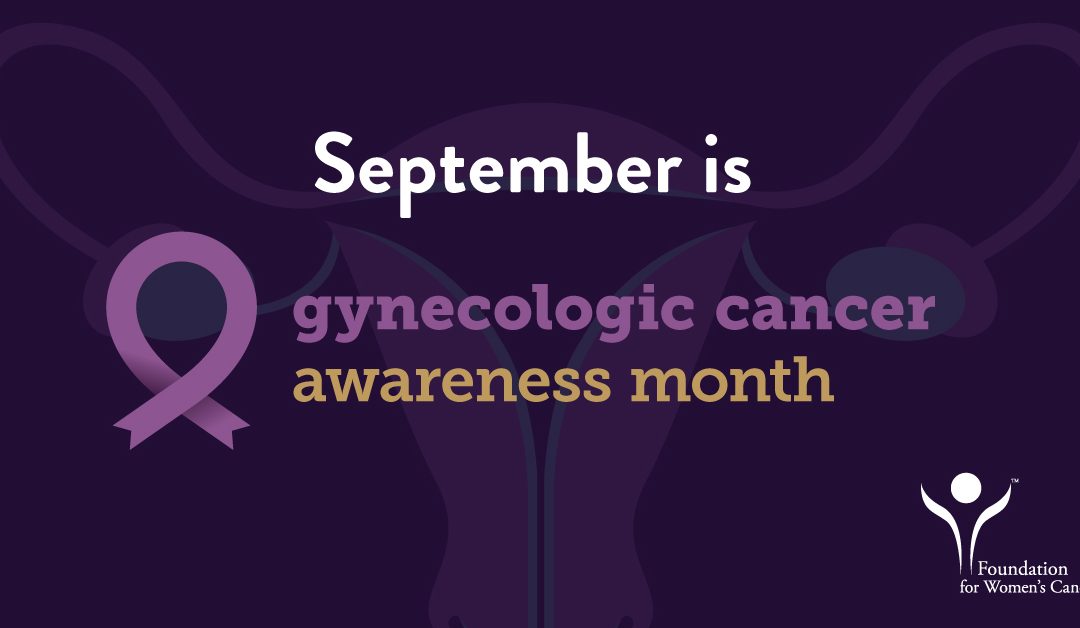Photo courtesy of the Foundation for Women’s Cancer
September is Gynecologic Cancer Awareness Month. As such, we wanted to share information and resources that can be important to women in our community. It is important to talk with your primary care physician, as well as your OBGYN, and discuss risk factors that can contribute to your risk of developing gynecologic cancer.
What is Cancer?
Cancer occurs in the body when cells mutate and grow abnormally. The cells will usually grow at a rate that is faster than normal cell multiplication. This results in uncontrollable growth in the form of tumors. Tumors can spread to other parts of the body. Cancer that spreads to other parts of the body is Malignant, or Stage IV.
Normal cells will only grow or multiply when signaled to do so. Cancer cells, however, grow rapidly and continue to multiply because the signaling systems in the cell are ignored. Even the commands that force a cell to die or stop multiplying are ineffective.
What is Gynecologic Cancer?
Gynecologic cancer is cancer that occurs within the female reproductive system. Generally, cancers within the reproductive system can have an adverse effect on fertility, future and current pregnancies, your menstrual cycle, menopausal symptoms, bladder & bowel control, and more.
Different Types of Gynecologic Cancer
There are 5 main types of Gynecologic cancer. Cervical, Ovarian, Uterine/Endometrial, Vaginal, and Vulvar. This section will discuss the basics of each of these 5 classifications.
Cervical Cancer
Cervical cancer begins in the cervix, where the womb opens into the vagina. The cervix is the natural barrier that protects the womb from bacteria, produces discharge to clean the vagina, and changes its position to help facilitate or protect a pregnancy. The cervix dilates and allows a baby to pass when it is ready to be born. Cervical cancer is the only gynecologic cancer that can be prevented with regular screenings and even a preventative vaccine via the HPV vaccination.
There are generally no precancer symptoms for Cervical cancer, so regular pap tests can help your gynecologist identify when cancer develops.
Ovarian Cancer
Ovarian cancer was once considered a “silent killer” because its symptoms are unlikely to develop until the survival rate has become poor. However, more recent studies have shown that the following symptoms occur more in early-stage ovarian cancer patients. Bloating, pelvic or abdominal pain, difficulty eating or feeling full quickly, frequent or urgent urinary symptoms. If you have these symptoms almost daily for more than a couple of weeks, you should see your gynecologist. Eary-stage diagnosis is vital to improve your rate of survival with any cancer, but especially Ovarian.
Uterine/Endometrial Cancer
Uterine cancer is that of the uterus. While there are a few different types of uterine cancer, Endometrial is the most common variety. It is a cancer of the uterine lining, also called the endometrium. This lining grows each month during a woman’s childbearing years. Then, the body expels it if there is not an embryo within the womb during your period.
The most common symptom of Endometrial cancer is abnormal bleeding from the vagina. Bleeding, spotting, or brownish discharge in post-menopausal women can be a sign of endometrial cancer. Pelvic and rectovaginal exams are important for a proper diagnosis if these symptoms occur.
Vaginal Cancer
Cancers of the vaginal tube, or birth canal, are most common in women aged 50-70. It is one of the rarest gynecologic cancers. Generally, this type of cancer is associated with HPV types 16 and 18, so the HPV vaccine can be vital in the prevention of this cancer. Vaginal cancers often do not have precancer or early-stage symptoms. However, advanced vaginal cancers can often have the following symptoms. Watery discharge, unusual vaginal bleeding, pain, urinary & bowel difficulties, and a mass or lump within the vagina.
Vulvar Cancer
Vulvar cancer is a rare tumor form that affects approximately 5,000 women in the US annually. The vulva includes the clitoris, the inner & outer lips of the vagina, the opening of the vagina, and its glands. If detected at an early stage, this type of cancer is highly curable. Preventative measures include protecting yourself from infection with the HPV vaccine, and regular check-ups with your gynecologist.
Gynecologic Oncology
If your gynecologist or primary care physician detects gynecologic cancer, you will likely be referred to a gynecologic oncologist. This is a medical doctor who specializes in treating these types of cancers. They can help you manage your care from further diagnosis to the completion of your treatment.
Gynecologic Cancer Resources
For more information on gynecologic cancers and your risk factors, speak with your primary care physician and your gynecologist. The CDC website has a wide array of resources for cancer screening and understanding Gynecologic cancer and its treatments. They even have cervical and breast cancer screening programs for low-income, underinsured, and uninsured women throughout the US. For more information about Gynecologic Cancer Awareness Month, visit the Foundation for Women’s Cancer’s website here.
Safe Harbor Healthcare Services does not provide medical, healthcare, or financial advice via articles. This material has been prepared for informational purposes only, and is not intended to provide, and should not be relied on for medical advice.
Safe Harbor Healthcare Services has been providing excellent home care on Staten Island since 1967. Our services help the elderly and disabled live safely and independently; while giving their families the peace of mind they need. For more information contact us by clicking here, or call (718)-979-6900.

